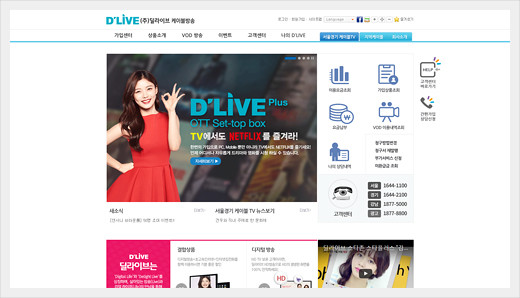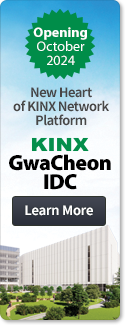D’LIVE
Service
IX Peering, Transit
SectorMedia·Broadcast
D’LIVE is the largest SO in the Seoul National Capital Area. It resolved the issue of increasing traffic costs caused by growing number of subscribers by joining KINX’s IX peering service.
#costreduction #stableserviceoperation #안정적인서비스운영

Introduction

D’LIVE is the Largest MSO in the Seoul National Capital Area and the Sole Partner of Netflix in Korea
D’LIVE, formerly known as C&M, founded in the year 2000, is a multiple-system operator (MSO) operating in the cable TV broadcasting, super-high-speed Internet and telecommunications sector. It is the biggest MSO in the Seoul National Capital Area with 15 cable broadcasting stations across the country. ecently, the company has been implementing aggressive strategies to gain dominance in the local Korean market such as signing a service launch license agreement with Netflix, the world’s No. 1 OTT operator.
Background

D’LIVE had been Seeking Measures to Effectively Reduce the Costs Arising from Increasing Traffic
As the largest MSO in Greater Seoul, D’LIVE began to see an increase in data usage by its subscribers year after year. Unlike mobile phone plans where there is a positive correlation between data usage and charges (i.e. an increase in usage resulting in a higher bill), cable SOs charge a flat rate based on the number of television and Internet lines, and thus the company needed to find a way to effectively reduce the costs incurred from the increase in data transmission.
What did KINX do?

Proposed and Suggested L2 Local Peering and L3 Transit Service
To effectively reduce the cost of data transmission, KINX proposed a combination of L2 peering and L3 transit service.
KINX is the only company in Korea that offers local peering as a service. This enables mutual exchanges of traffic on a settlement-free basis with some 40 peering members including major ISPs, SOs, and CPs in Korea. The service experiences 895G of peering traffic. This service helps not only improve the Internet quality but also reduce the connection cost. At present, 3 million people, accounting for approximately 17% of all Internet subscribers in Korea, access the Internet via KINX.
As for the transit service, it allows the company to interconnect with any global or domesitic carrier operators and purchase the selected carriers’ transit service. This allows companies to select the optimal routing path and even purchase transit from two or more operators.
Effect

Effective Cost Reduction and Reliable Internet Service
By using KINX’s IX service and transit service, D’LIVE was able to lower its transit costs and raise security and reliability of the network usage through interconnections with the peering members. In addition, by diversifying and choosing two or more carrier operators, the company is now able to deliver data via the shortest route possible.


















